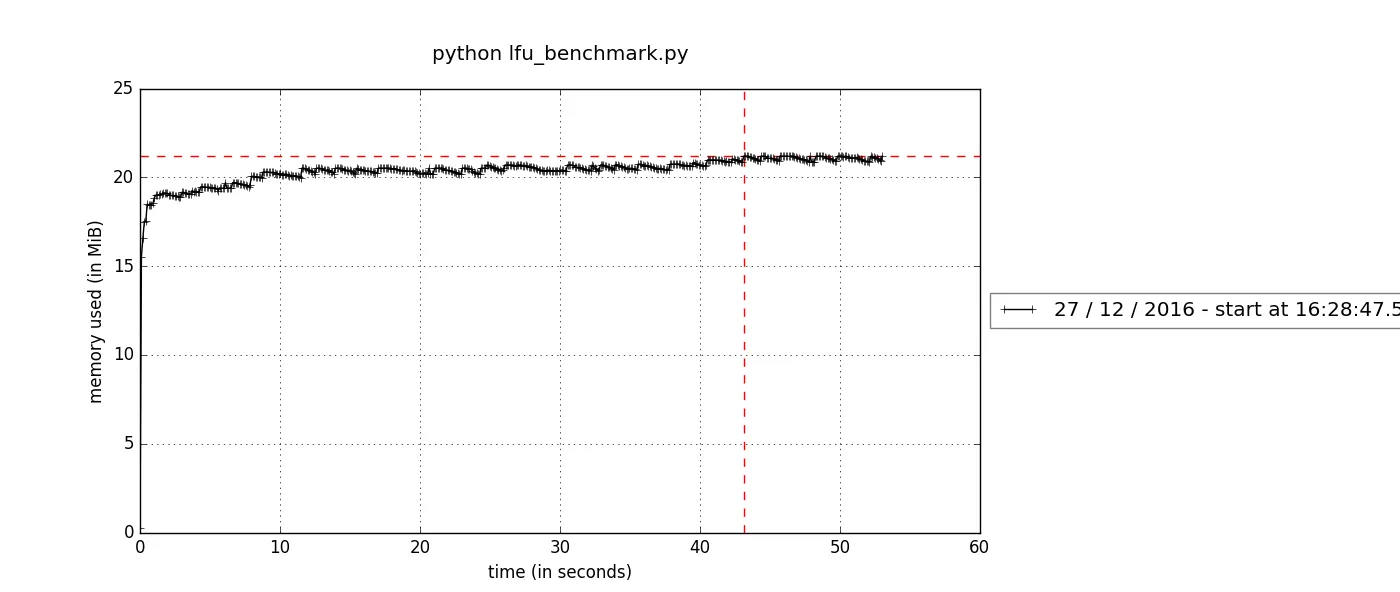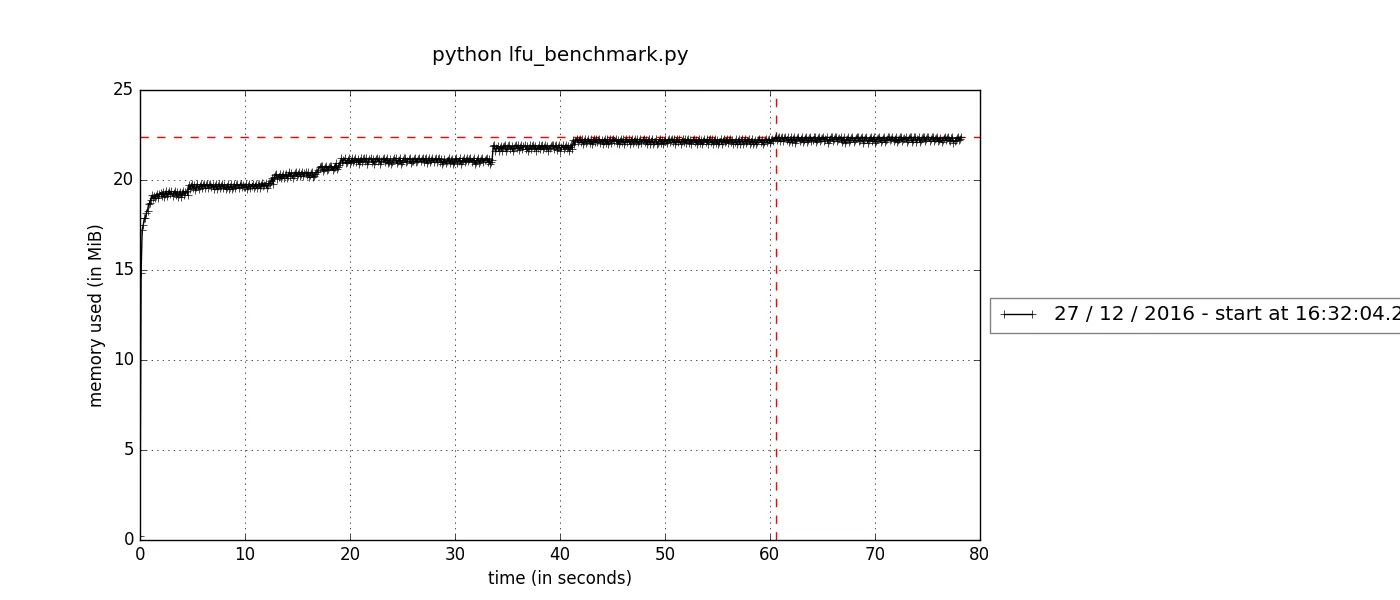LFU Cache in Python
python algorithm interviewIn the last post, we explore the LRU cache implementation with OrderedDict, now comes to the new challenge: can you implement a Least Frequently Used (LFU) cache with the similar constraints?
- time complexity for read(
get) and write(set) operations - if the cache grows out of the capacity limit, the least frequently used item is invalidated. If there exists a tie, the least recently accessed key will be evicted1.
Track the accesses with doubly linked list
It is pretty obvious that we MUST use dict as the internal data store to
achieve the complexity for the data access, and somehow keep cache items
sorted with the access frequency all the time. Otherwise, the data eviction
has to iterate all cache items(aka complexity) to find the least
frequently used.
Inspired by the LRU cache implementation, the accesses frequency is tracked with
a doubly linked list (see here for the linked list operations details,
such as dll_append). Without loss of generality, we store all the item
(key, value) pair and an access counter sorted by the number of accesses in
the descending order.
- For any operations with cache hits, the node is moved towards the list head to maintain the order.
- For
setoperation with a cache miss, the tail node will be evicted if the cache reaches capacity limit. A new node is appended then moved accordingly.
class LFUCache(object):
def __init__(self, capacity, update_func):
self.capacity = capacity
self.update_freq = update_func
self.cache = dict()
self.head = dll_init()
def set(self, key, value):
# special case for capacity <= 0
if self.capacity <= 0:
return
# Does the key exist in the cache?
node = self.cache.get(key)
if node:
key, _, counter = node[2]
node[2] = (key, value, counter)
self.update_freq(node, self.head)
return
# Remove the LRU key if exceeding the capacity
if len(self.cache) >= self.capacity:
# remove the last element
node = dll_remove(self.head[0])
self.cache.pop(node[2][0])
# Append to the end of double-linked list
node = dll_append(self.head, (key, value, 0))
self.cache[key] = node
self.update_freq(node, self.head)
def get(self, key):
node = self.cache.get(key)
if node is None:
return -1
self.update_freq(node, self.head)
return node[2][1]The preliminary profiling shows that the majority CPU time is spent on the
linked list reordering, so the LFUCache.update_freq method is deliberately
extracted externally to test the different policies. For example, the first
attempt takes a bubble-sortesque approach:
- If the access counter of the node is no less than the its precedence, swap them.
- Repeat the step 1 until the condition no longer stands.
def bubble_update(node, head):
# Update the access counter of the node, then bubble it up
# by swapping the node with its precedence.
# update access count for node
prev, next_, (key, value, counter) = node
counter += 1
node[2] = (key, value, counter)
while(prev is not head and prev[2][2] <= counter):
# swap prev and node
prev2 = prev[0]
prev2[1] = node
node[0] = prev2
node[1] = prev
prev[0] = node
prev[1] = next_
next_[0] = prev
# reset all variables for the next loop
next_ = prev
prev = prev2
prev2 = prev[0]In a synthetic benchmark, 7941 get, 12558 set ops on 2K-entry cache take
more than 30 seconds in the profiling. If the cache is so ridiculously slow, why
bother?
I then found an optimization with a insert-sortesque approach to avoid the expensive swap operation:
- Iterate the precedences of the node until the access counter of the precedence, aka pivot, is larger than the node.
- Insert the node after the pivot.
def insert_update(node, head):
'''Update the access counter, then find the pivot from the
tail of the linked list, insert the node AFTER the pivot.'''
# update access count for node
pivot, _, (key, value, counter) = node
counter += 1
node[2] = (key, value, counter)
while(pivot is not head and pivot[2][2] <= counter):
pivot = pivot[0]
# Insert the node AFTER the pivot
if pivot is not node[0]:
# remove the node from the linked list
dll_remove(node)
# insert after the pivot
node[1] = pivot[1]
node[0] = pivot
pivot[1][0] = node
pivot[1] = nodeThis performs significantly better, 8.45s in the synthetic benchmark with profiling enabled, but still way too slow. The profiling shows that 99.4% CPU time is spent on the doubly linked list traversal, and we do it linearly, anyway we can leverage the sorted linked list to make it faster?
Put it in the bucket
The lfu paper presents a neat solution to address the performance issue: the single doubly linked list is segmented to multiple buckets, the node with the same access counter are put into the same bucket in the order of recentness. When the access counter is updated, we can simply pop the node from the current bucket, and place it to the new bucket. Illustrated as below:
I take a simplified detour to explore the idea but avoiding the hustle of wrangling doubly doubly linked list: a lookup table is used to map the access counter to the bucket. This may incur complexity of the key eviction in the worst case; but it turns out that it performs very well, — 0.35s with profiling enabled, a 24x performance boost.
from collections import defaultdict
class LFUCache2(object):
def __init__(self, capacity, *args):
self.capacity = capacity
self.bucket_lut = defaultdict(dll_init)
self.cache = dict()
def remove_node(self, node):
# Remove the node from the cache and also the bucket
_, _, (key, value, counter) = node
dll_remove(node)
self.cache.pop(key)
# clean up the freq_head if it is empty
bucket = self.bucket_lut[counter]
if bucket[1] is bucket:
self.bucket_lut.pop(counter)
def add_node(self, data):
# Create a node to host the data, add it to cache and
# append to the bucket.
bucket = self.bucket_lut[data[2]]
node = dll_append(bucket, data)
self.cache[data[0]] = node
def set(self, key, value):
# special case for capacity <= 0
if self.capacity <= 0:
return
# Does the key exist in the cache?
node = self.cache.get(key)
if node:
# Update the value and counter
counter = node[2][2]
self.remove_node(node)
self.add_node((key, value, counter + 1))
return
if len(self.cache) >= self.capacity:
# Remove the least used, least recently accessed
min_counter = min(self.bucket_lut.keys())
bucket = self.bucket_lut[min_counter]
self.remove_node(bucket[1])
self.add_node((key, value, 1))
def get(self, key):
node = self.cache.get(key)
if node is None:
return -1
key, value, counter = node[2]
self.remove_node(node)
self.add_node((key, value, counter + 1))
return valueIt took many hours to get the doubly doubly linked list solution right due to
its complexity. I had to use the namedtuple to sort out the list index. And it
just performed as well as the simplified version.
from collections import namedtuple
# head points to the doubly linked list of Node
Bucket = namedtuple('Bucket', ['counter', 'head'])
# item caches a reference to the bucket_node for quick accss the next bucket
Item = namedtuple('Item',['key', 'value', 'bucket_node'])
class LFUCache3(object):
def __init__(self, capacity, *args):
self.capacity = capacity
self.bucket_head = dll_init()
self.cache = dict()
def remove_node(self, node):
item = node[2]
self.cache.pop(item.key) # remove from cache
dll_remove(node) # remove node from the bucket
bucket = item.bucket_node[2]
if bucket.head[1] is bucket.head:
# remove the bucket if empty
dll_remove(item.bucket_node)
def add_node(self, key, value, original_bucket_node):
'''Add the (key, value) content pulled from orginal_bucket_node
to a new bucket'''
counter = 0 if original_bucket_node is self.bucket_head \
else (original_bucket_node[2].counter)
next_bucket_node = original_bucket_node[1]
if next_bucket_node is self.bucket_head:
# No bucket(counter + k) exists, append a new bucket(counter + 1)
bucket = Bucket(counter + 1, dll_init())
bucket_node = dll_append(self.bucket_head, bucket)
elif next_bucket_node[2].counter != counter + 1:
# bucket(counter + k) exist, insert bucket(counter + 1) BEFORE next_bucket_node
bucket = Bucket(counter + 1, dll_init())
bucket_node = dll_insert_before(next_bucket_node, bucket)
else:
# bucket(counter + 1) exists, use it
bucket = next_bucket_node[2]
bucket_node = next_bucket_node
# Create the item, append it to the bucket and add to the cache.
item = Item(key, value, bucket_node)
self.cache[key] = dll_append(bucket.head, item)
def set(self, key, value):
# special case for capacity <= 0
if self.capacity <= 0:
return
# Does the key exist in the cache?
node = self.cache.get(key)
if node:
item = node[2]
self.remove_node(node)
self.add_node(item.key, value, item.bucket_node)
return
if len(self.cache) >= self.capacity:
# Apply LRFU alogrithm here!
bucket = self.bucket_head[1][2]
self.remove_node(bucket.head[1])
self.add_node(key, value, self.bucket_head)
def get(self, key):
node = self.cache.get(key)
if node is None:
return -1
item = node[2]
self.remove_node(node)
self.add_node(item.key, item.value, item.bucket_node)
return item.valueCheck the memory leak
The memory leak is probably the biggest concern of a cache implementation, especially we are dealing with the circulated reference. Before declaring success, I’d like to run a benchmark to check the memory consumption first:
def setup():
with open('lfu-cache-test-fixture.json') as f:
fixture = json.load(f)
cache = LFUCache2(2048) # or LFUCache3
return cache, fixture
def benchmark(cache, fixture):
lut = {
'set': cache.set,
'get': cache.get
}
for method, args in zip(*fixture):
lut[method](*args)
gc.collect()
if __name__ == "__main__":
print(timeit.timeit('benchmark(*setup())', setup='from __main__ import setup, benchmark', number=1000))After installing memory_profiler, you may run the following command to sample
memory consumption every 0.1s:
mprof run python lfu_benchmark.py
mprof plotAnd the memory stats for both LFUCache2 and LFUCache3 look quite healthy.


Please checkout my notebook if you prefer a backstage pass.
Footnotes
-
Technically, the combination of LFU algorithm and LRU algorithm is called LRFU. ↩